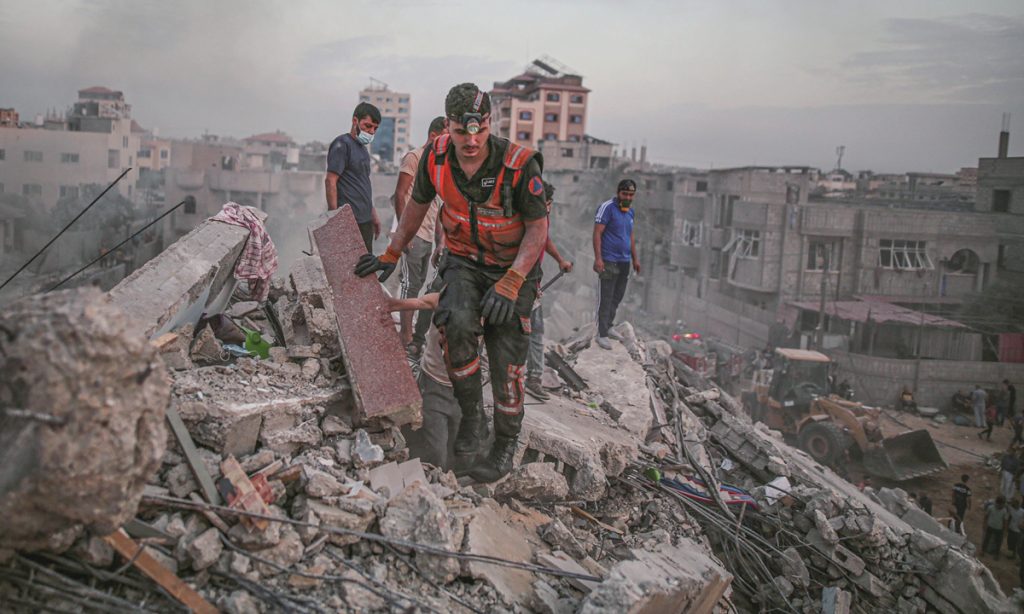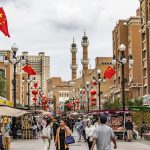Political efforts must be intensified to solve intractable cycles of violence and humanitarian crises in Gaza: ICRC officer

Editor's Note:
The death toll among Palestinians from Israeli attacks on the Gaza Strip has risen pass 8,500, according to the official Palestinian news agency WAFA, while more than 1,400 people in Israel have lost their lives, the vast majority in the Hamas attack on October 7. The Gaza Strip now faces a serious humanitarian crisis that has captured worldwide attention. China has also sent urgent humanitarian aid to meet the emergent needs in the Gaza Strip. What is the latest situation in the Gaza Strip? What form of aid do the local communities need most? Global Times reporters Xie Wenting and Bai Yunyi (GT) spoke with Christoph Hanger (Hanger), Public Relations Officer at the International Committee of the Red Cross, about these issues.
GT: Can you provide an overview of the current situation in the Gaza Strip and the Israel-Palestinian conflict? How has it evolved in recent days?
Hanger: The recent violence is at a level that we have not seen in many years. It has the potential to escalate dramatically, causing even more suffering to civilians on both sides. At this crucial turning point, we urge the parties to take every possible step to prevent civilians and civilian infrastructure such as electricity and water supplies from coming to further harm.
Right now, Israeli families are worried about loved ones who have been taken hostage. The taking of hostages is prohibited under international humanitarian law and anyone being held should be released. We are now in contact with Hamas and Israeli officials as part of the efforts in this issue. We stand ready as a neutral intermediary to conduct humanitarian visits; facilitate communication between hostages and family members; and facilitate any eventual release.
As Gaza loses power, hospitals lose power, putting newborns in incubators and elderly patients on oxygen at risk. Without electricity, hospitals risk turning into morgues. Water can no longer be pumped or desalinated, leaving families with no access to clean drinking water. Wastewater will likely flood, creating a risk of disease outbreaks. People in Gaza will also lose telecommunications to reach loved ones, further isolating them and deepening the challenges they face in these very difficult times.
Most hospitals in Gaza are no longer functioning properly. They need power to maintain their services. With fuel supplies running low, impacting additional generators, the hospitals are in a very concerning situation.
Three out of five wastewater plants are no longer functioning, meaning sewage is being pumped directly into the sea.
Two desalination plants - vital for removing salt from seawater - are out of operation due to the electricity shortage. As a result, it's estimated that there has been a 40 percent reduction in water availability in Gaza.
We managed to get in contact with our colleagues in Gaza. We can use this holding line from now on: We are experiencing severe difficulties to stay in contact with our team in Gaza due to the suspension of telecommunications. Although connections have been sporadic, we have confirmed their safety. They remain dedicated to distributing aid on the ground, even though the lack of communication has made the task extremely complicated.
GT: What are the main challenges now faced by the International Committee of the Red Cross (ICRC) in providing humanitarian aid and assistance in the region?
Hanger: Security and access are big challenges. Humanitarian organizations, ambulances, and medical workers must also be allowed to carry out their life-saving work safely. Our teams need to be able to move inside Gaza safely. We have fuel, medical items, and other supplies in Gaza that could save lives - but we need to be able to safely get them to people in need. In recent days, our teams have been able to deliver fuel to the water sector; truck water within Gaza city; install batteries into water pumping stations to keep them working; and set up water storage tanks. We can do much more, but we need the safety guarantees to be able to move safely. Medical professionals must be able to respond without fear for their own lives. Any violence toward medical personnel is unacceptable.
At the same time, we are exploring all avenues to bring life-saving aid into Gaza. We are in the process of pre-positioning life-saving supplies in Egypt from Amman so that we're ready when access to Gaza is granted, which it must urgently be. This initial goods convoy includes medicine and thousands of household kits for families which include hygiene items and chlorine tablets for drinking water.
We are also urgently deploying staff to relieve colleagues in Gaza whenever we are able to move in. This includes a mobile surgical team and other health staff, a weapons contamination expert, and relief coordinators specialized in water, habitat, and food security.
GT: What are the specific humanitarian needs of the affected population in the region? What are the most pressing issues they are facing?
Hanger: The most pressing issues are currently the lack of food and water. The markets are even closed or do not get replenished with supplies. Demand is high for food and water and there is no access at all to fuel in some areas. Some people do not have any way of relocating or evacuating from their homes.
Our teams have seen thousands of people, including children and elderly citizens, walking for tens of kilometers with only what they can carry in an effort to evacuate the northern areas.
People are waiting for humanitarian aid to enter. They are on the side of the roads with no roofs over their heads, water supplies dwindling, and lack power and food.
Medical facilities on both sides of the border are under increased pressure, which will get worse if they are damaged or do not have the necessary energy and medical supplies. It is vital that healthcare workers and health facilities are protected so people can get the treatment they need. They also need electricity and steady supplies of medicines.
The level of humanitarian needs created by the violence requires sustained humanitarian relief. Hospitals will simply stop being able to care for patients because they will run out of supplies. We will not be able to sustain a humanitarian response unless we can get more supplies into Gaza. This can be done through a humanitarian corridor or pause in the fighting and would welcome any agreement that would allow for this. However, a humanitarian corridor in place or not, international humanitarian law is clear: Civilians have a right to receive humanitarian assistance. Depriving them of this only leads to greater suffering.
GT: China has recently announced the dispatch of urgent humanitarian aid to the affected and a call to de-escalate the conflict to avoid more civilian casualties. How do you evaluate China's humanitarian aid in the region? How do you view China's approach to conflict resolution and its potential to influence other stakeholders in the Israeli-Palestinian conflict?
Hanger: China is playing an increasingly active role in international humanitarian affairs. We are aware of and acknowledge China's announcement of providing humanitarian aid for Gaza, its consistent calls for the protection of civilians, and respect for international humanitarian law. We hope that the diplomatic efforts of the international community will soon result in respite for civilians in Gaza.
Only political steps can solve the seemingly intractable cycles of violence and the humanitarian crises that accompany them. Political efforts must be intensified. The impact of this latest violence will have short- and long-term repercussions. If international humanitarian law is completely disregarded, suffering will worsen and a political solution to end this bloodshed will be harder to find.
GT: What are the long-term implications of the current conflict on the humanitarian situation in the Gaza Strip? How does the ICRC plan to address these challenges in the coming months?
Hanger: The impact of this violence is affecting many communities. In Gaza, the latest violence comes on top of 16 years of restrictions on the movement of people and goods, which have hit the economy and life of residents of Gaza. During hostilities, essential medical transfers cannot take place. Fuel cannot be imported. Medicines become harder to find and costlier. There is a heavy reliance on generators for those who have them.
The impact of this latest violence will have short- and long-term repercussions. If international humanitarian law is completely disregarded, suffering will worsen and a political solution to end this bloodshed will be harder to find. We are exploring all avenues to bring life-saving aid into Gaza. We are in the process of pre-positioning life-saving supplies in Egypt from Amman so that we're ready when access to Gaza is granted, which it must urgently be. This initial goods convoy includes medicine and 6,000 household kits for families which include hygiene items and chlorine tablets for drinking water.
We are also urgently deploying staff to relieve colleagues in Gaza whenever we are able to move in. This includes a mobile surgical team and other health staff, a weapons contamination expert, and relief coordinators specialized in water, habitat, and food security.
In recent days, our teams have been able to deliver fuel to the water sector; truck water within Gaza City; install batteries into water pumping stations to keep them working; and set up water storage tanks (enough to supply about 250,000 people with water). We also have supplies that could help make some repairs to the water network, but need to be able to do this safely. We also provided mattresses, wheelchairs, crutches and other items to the Ministry of Health on 11 October.
The impact of the recent escalation of violence on the youth is also worrying. With every round of fighting, the civilians of Gaza are left worse off. A whole generation of youth in Gaza has grown up knowing nothing but closed borders, the trauma of conflict and its painful legacies. About half of the population in Gaza is under 18 years old and has lived many major military operations and countless escalations for most of their lifetime. They need a glimpse of hope, a future to look forward to.



